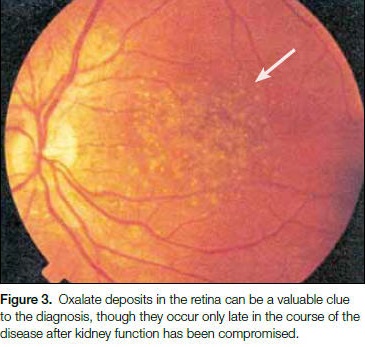Hyperoxaluria and Oxalosis Causes, Symptoms, Diagnosis and Treatment

What Is Hyperaoxaluria And Oxalosis ?
Hyperoxaluria, which is usually a genetic condition, is defined as excretion of excessive oxalate in the urine.
Oxalate is a chemical which is present in the body and can be a part ofyour diet as well since it is present in minute quantities in certain food items. It is when the excretion is excessive that problems arise.
There are two types of hyperoxaluria
Type 1: associated with AGXT protein which is an enzyme involved in breakdown of oxalate
Type 2: associated with GRHPR. It leads to excessive absorption of oxalate from the colon
If hyperoxaluria is not diagnosed at the right time and treatment is not commenced, kidneys can incur a great deal of damage.
Oxalosis happens when the kidneys fail owing to hyperoxaluria and excess oxalate is accumulated in the blood. This eventually leads to the deposition of oxalate in blood vessels, bones and other body organs
Causes Of Hyperoxaluria And Oxolisis:
Oxalosis commonly results owing to renal failure which is associated with hyperoxaluria
Causes of hyperoxaluria include
- Genetics
- Intestinal diseases
- Diet high in oxalate content
Symptoms Of Hyperoxaluria And Oxalosis:
The signs and symptoms of the condition include
- Blood in the urine: this is usually the earliest manifestation of oxalosis
- UTI can also occur early in the course of disease
- Nausea and vomiting
- Abdominal pain
- Tetany
- Proteinuria
- Urinary tract obstruction
- Kidney fibrosis
In the advanced stage of the disease, owing to accumulation of oxalate crystals in bone and other organs, Bone disease, anemia, and skin ulcers may result
Diagnosis Of Hyperoxaluria And Oxalosis:
The diagnosis of oxalosis mainly depends upon imaging tests which include
- Urine DR
- Sonogram
- Radiological exam
- Microscopic examination of renal tissues
Treatment Of Hyperoxaluria And Oxalosis:
Treatment of hyperoxaluria depends on the type. In case of primary hyperoxaluria, it is renal transplant which is the ultimate treatment. Secondary hyperoxaluria which is more common can be treated by limiting dietary oxalate and giving high dose calcium supplements to the child
Treatment of oxalosis depends on the stage at which it was diagnosed. Treatment options include
- Increased fluid intake
- Doses of vitamin B6
- Magnesium supplements
- Restriction of diet containing oxalate
- Urinary tract endoscopy
- Dialysis
- Artificial kidney machine
- Kidney transplant
In advanced cases, renal transplant becomes necessary as dialysis fails to keep up with the accumulation of oxalate
By : Natural Health News




